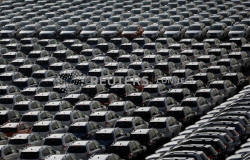Japanese car sales slump in South Korea as diplomatic row worsens
 Send a link to a friend
Send a link to a friend
 [August 05, 2019] By
Hyunjoo Jin [August 05, 2019] By
Hyunjoo Jin
SEOUL (Reuters) - Sales of Japanese-branded
autos in South Korea slumped in July amid a worsening diplomatic row
between the two countries that has led to consumer boycotts and efforts
by Seoul to cut the economy's reliance on imports from Japan.
Toyota Motor's <7203.T> sales in South Korea tumbled 32% from a year
earlier while Honda's <7267.T> sales skidded 34%, industry data out of
South Korea showed on Monday.
Although automakers are still assessing the main factors driving the
declines last month, industry participants and analysts expect an
intensifying boycott campaign to hurt demand further, as diplomatic
tensions grow.
Japan tightened controls in July on exports to South Korea, escalating a
row over wartime forced laborers and sparking a boycott by South Korean
consumers of Japanese products and services, from cars, beer and pens to
tours.
On Friday, Japan escalated tensions by removing South Korea from a list
of export destinations approved for fast-track status.

"Showroom visits are declining while consumers are holding off on
signing contracts," a Honda Korea official told Reuters, asking not to
be identified because of the sensitivity of the matter.
South Korean representatives for Honda and Toyota did not provide any
commentary on the sales trends and said they would need to assess the
reasons for the decline.
However, industry watchers said public sentiment was a factor behind the
sharp falls.
"The South Korean public is angry about Japan...It will soon become a
taboo to drive Japanese cars in Korea," said Kim Pil-soo, an automotive
engineering professor at Daelim University College.
The data from the Korea Automobile Importers & Distributors Association
(KAIDA) also showed sales by Lexus, Toyota's luxury badge and the
third-most imported brand into South Korea after Mercedes and BMW, down
25% from the previous month, although they were still up 33% from the
previous year.
Japanese officials have cited unspecified security reasons for the
export curbs to South Korea. But they have also pointed to an erosion of
trust after South Korean court rulings last year ordered Japanese firms
to compensate wartime forced laborers, a matter Tokyo says was settled
by a 1965 treaty normalizing bilateral ties.
South Korean shares ended down 2.6% to their lowest in more than three
years on Monday, tracking broader moves in Asia as the Sino-U.S. trade
war intensified but also weighed by uncertainty over the diplomatic
dispute between Seoul and Tokyo.
SELF-SUFFICIENT
Earlier on Monday, South Korea's government announced plans to invest
about 7.8 trillion won ($6.48 billion) in research and development for
local materials, parts and equipment over the next seven years to help
cut reliance on Japanese imports.
[to top of second column] |

A South Korean woman attends an anti-Japan rally near the Japanese
embassy in Seoul, South Korea, August 3, 2019. REUTERS/Kim Hong-Ji

South Korea plans to improve economic "self-sufficiency" in regards to
the production of 100 key components, materials and equipment items used
to make chips, displays, batteries, automobiles and other products. The
government aims to stabilize supply of these items over the next five
years.
South Korean President Moon Jae-in, who promotes rapprochement with the
nuclear-armed North Korea, said later on Monday that an inter-Korean
economic cooperation would allow Korea to overcome Japan's lead.
[L4N2511Y7]
"Japan can never prevent our economy from making a leap forward," he
said at a weekly meeting with senior presidential aides, adding that
Japan will be a "catalyst" for Korea's resolve to become an economic
powerhouse.
While foreign-branded cars make up a small portion of domestic auto
sales in South Korea, the business community is concerned a consumer
swing away from Japanese imports for political reasons could grow in
other sectors, such as tourism and retail.
South Korea's foreign ministry on Monday began to send out travel
advisory alert texts to South Koreans traveling to Japan, a foreign
ministry official told Reuters.
"South Korean government has been closely monitoring the possibility of
anti-Korean protests run by Japanese conservative groups, and we advise
South Koreans visiting Japan to refrain from visiting anti-Korean
protest sites and to be mindful of personal safety through safety text
messages," said the official.

Japan's Fast Retailing <9983.T> fashion brand Uniqlo has been a prime
target for the boycott, with its 186 stores in South Korea making the
country its second-biggest overseas market in terms of outlets.
Fast Retailing chief financial officer Takeshi Okazaki last month
acknowledged there had been some impact on its sales as a result of the
campaign, without elaborating.
Japan's Asahi Group Holdings <2502.T>, whose Asahi Super Dry is the most
popular import brand in South Korea, said on Thursday the boycott had
hit its beer sales as it lowered its profit guidance slightly.
(Reporting by Hyunjoo Jin; Additional reporting by Hayoung Choi,
Heekyong Yang; Editing by Muralikumar Anantharaman and Jacqueline Wong)
[© 2019 Thomson Reuters. All rights
reserved.] Copyright 2019 Reuters. All rights reserved. This material may not be published,
broadcast, rewritten or redistributed.
Thompson Reuters is solely responsible for this content. |